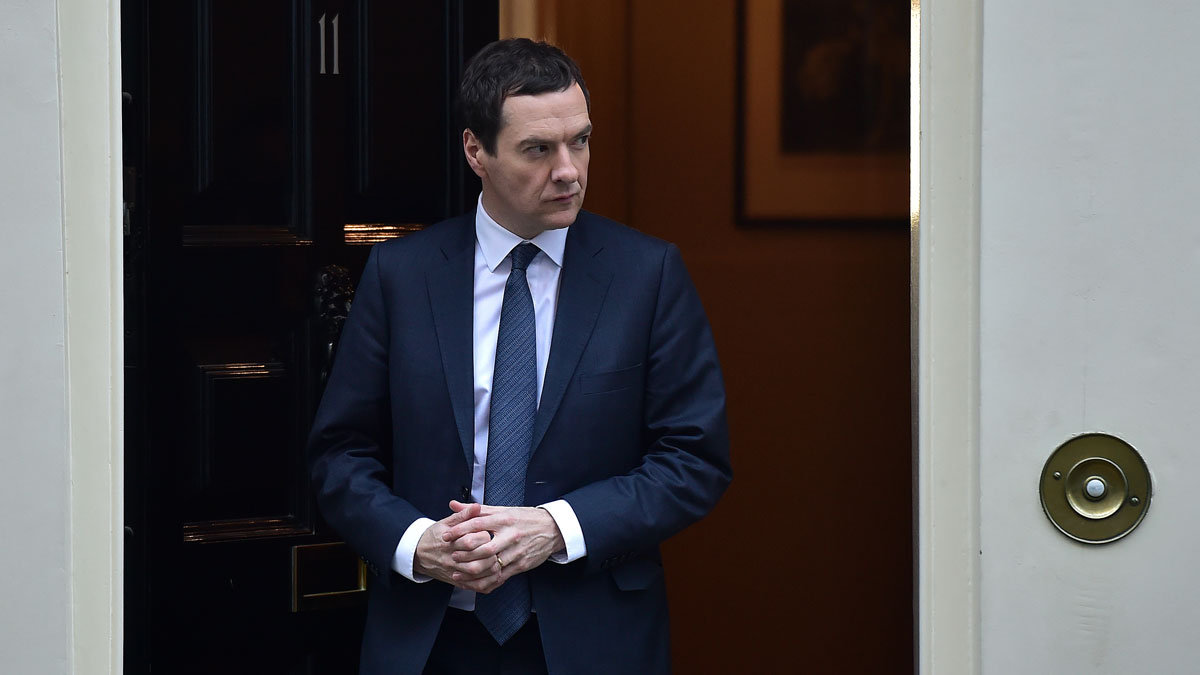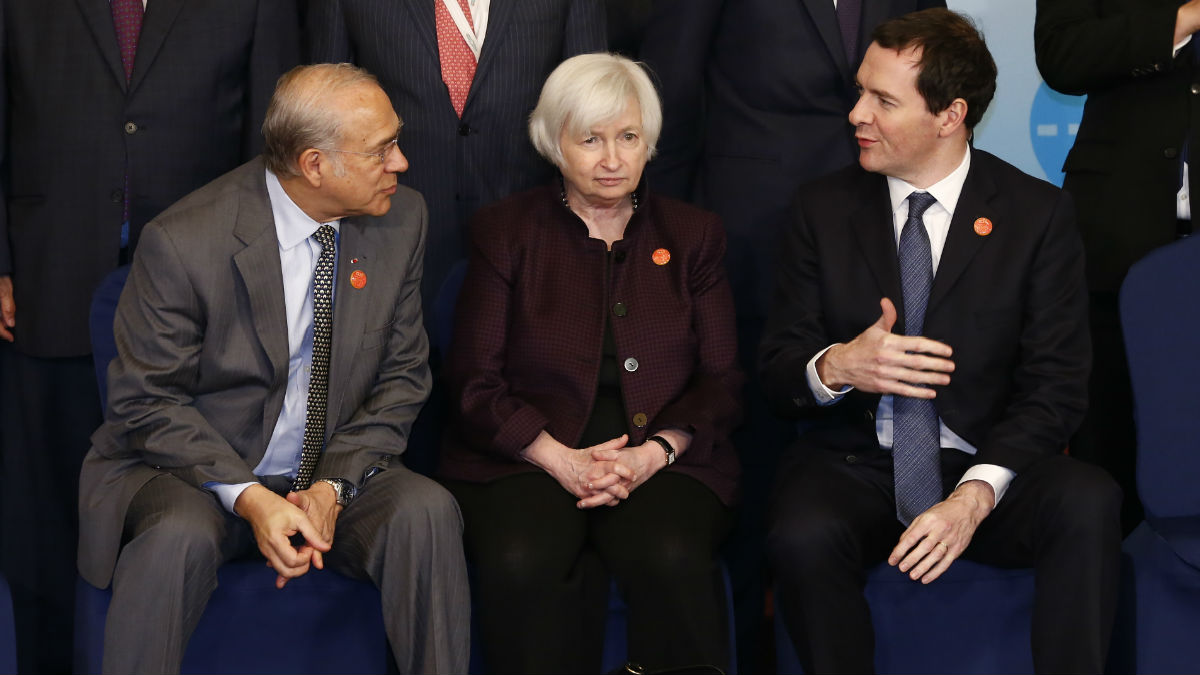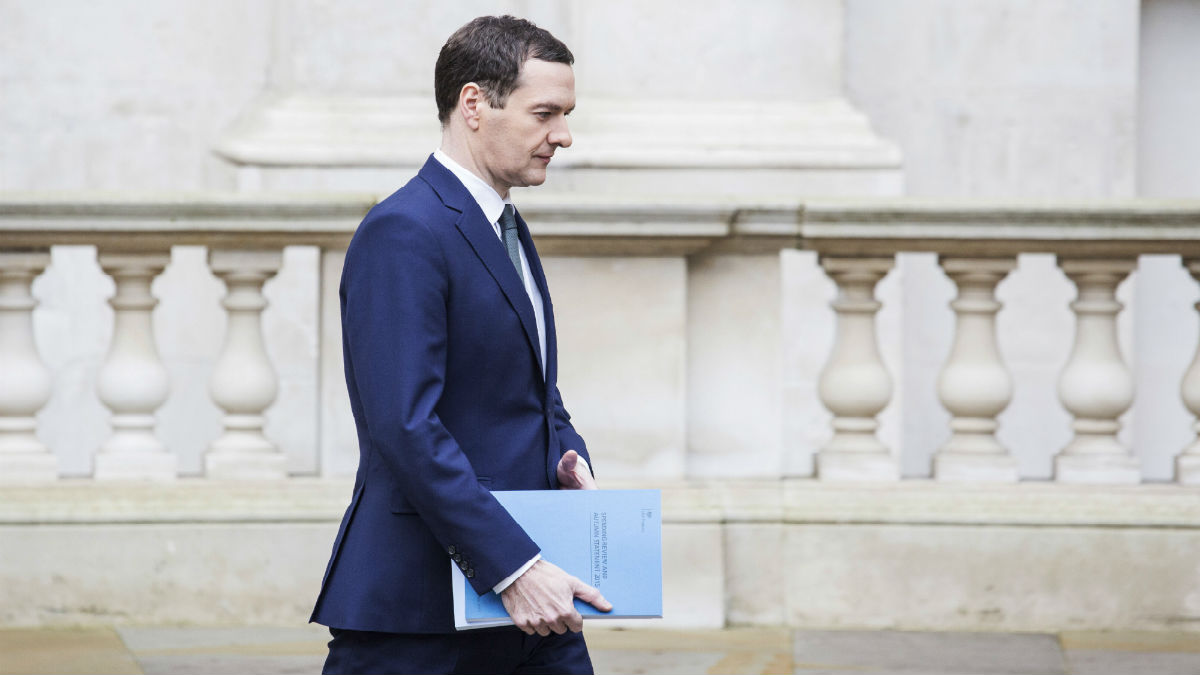How Osborne got himself in a pickle on disability benefit cuts
'Arbitrary' decision to apply a brutal welfare cap prompted 'desperate search for savings' and has left target in tatters

A free daily email with the biggest news stories of the day – and the best features from TheWeek.com
You are now subscribed
Your newsletter sign-up was successful
George Osborne has no one to blame but himself for his latest welfare cuts humiliation, Philip Aldrick argues in The Times.
The journalist cites the words of the former work and pensions secretary, Iain Duncan Smith, who said he had been forced to operate within "arbitrary" confines on spending. This had prompted a "desperate search for savings" in unprotected areas and resulted in profoundly unfair outcomes, added the politician.
Aldrick agrees - and in particular points to "an act of fiscal masochism" on the benefits cap that prompted the Chancellor to announce cuts to personal independence payments for the disabled.
The Week
Escape your echo chamber. Get the facts behind the news, plus analysis from multiple perspectives.

Sign up for The Week's Free Newsletters
From our morning news briefing to a weekly Good News Newsletter, get the best of The Week delivered directly to your inbox.
From our morning news briefing to a weekly Good News Newsletter, get the best of The Week delivered directly to your inbox.
The changes, which would have seen payments reduced or withdrawn from those who use aids around their home, were eventually scrapped this week, as the government faced a Commons defeat orchestrated by its own backbenchers.
The proposed cuts would have come on top of the £12bn of reductions announced in the July Budget last year. But, notes Aldrick, the "welfare cap" was lowered at that time by a much larger £16.3bn, from £129.8bn to £113.5bn.
Osborne cut more from the Budget than he needed - he was already due to spend £3.3bn less than his original target and had benefitted to the tune of £1bn from the Office for Budget Responsibility's forecast revision. The Chancellor "could have left the cap unchanged, cut it by £12bn or slashed it to match the new outlook". In the event, he "went the whole hog".
If he'd cut by just the £12bn promised in the manifesto then, if the two per cent overspend he is allowed is included, he "could have scrapped the disability benefit cuts and met his rule with £300m to spare".
A free daily email with the biggest news stories of the day – and the best features from TheWeek.com
Under his more brutal target, he would have been £400m short even with the disability cuts, while the furore and eventual reversal has damaged his reputation, future leadership and prime ministerial hopes and credibility of the Conservative Party. He is now also £4.4bn short of his week-old fiscal projections and has given no sign if or how this will be filled.
Osborne said on Tuesday that there would be no further cuts to welfare spending in this parliament, in a combative speech the Financial Times describes as a "robust performance". He also confirmed that under latest forecasts, even with the U-turns on disability benefits and, in November, working tax credits, he would hit the pledge to cut the benefits bill by £12bn.
Osborne 'banned from welfare cuts' after disability benefit climbdown
22 March
George Osborne has been "banned… from making further cuts to welfare spending" by Prime Minister David Cameron, reports The Times, as the government struggles to re-establish credibility after a humiliating climbdown on disability benefits.
In his Budget last week, the Chancellor had announced £4.4bn of planned cuts to personal independence payments in the coming years.
However, speaking in the Commons yesterday, the new Work and Pensions Secretary Stephen Crabb confirmed they would not go ahead and that the government was "not seeking" any other cuts to welfare spending to fill the black hole this will leave in saving targets.
"I am absolutely clear that a compassionate and fair welfare system should not be just about the numbers," he said. "Behind every statistic there is a human being and perhaps sometimes in government we forget that."
The turnaround comes after the sensational departure of Crabb's predecessor, Iain Duncan Smith, who announced his resignation in an open letter on Friday that inflicted huge damage on the Conservative Party and the Chancellor in particular, accusing Osborne of driving through unfair spending cuts concentrated among working age people.
In a series of Budget U-turns, the government also confirmed yesterday it will not oppose a Labour amendment to remove VAT on feminine hygiene products, following a legal change on the issue in Brussels, and backed down over VAT on home insulation and renewable energy products.
While the chancellor generally looks after all budgetary issues, the Prime Minister "took charge" yesterday, a move described by one Tory source as unusual. Cameron also mounted a defence of what he described as the "compassionate" and "one nation" Conservatism at the heart of his government's agenda, saying it has seen changes such as lifting more low-paid people out of tax and the introduction of a national living wage.
Osborne faces the music
The Chancellor makes his first post-Budget speech since later today, in a Commons debate on his policies. He is facing calls from Labour to resign over the series of embarrassing U-turns – and the party is also demanding the Budget be withdrawn and resubmitted with updated fiscal forecasts.
The government had projected a late swing into a £10.4bn surplus for the country's finances by the final year of this parliament. Osborne can now either opt to allow the £4.4bn of cumulative costs to be taken from this buffer or make cuts elsewhere to balance the books.
Yesterday, Crabb said the government was still meeting its manifesto pledge to lower welfare spending after a fresh round of reductions were voted through two weeks ago, including cuts to incapacity benefits to bring them into line with jobseekers allowance. The Department for Works and Pensions said annual savings of £12bn would still be delivered by the end of this parliament.
Osborne is expected to face a grilling today – and possibly not just from the opposition benches – but the Financial Times says he will also go on the offensive and remind his own backbenchers the party was elected less than a year ago on a manifesto of "economic security, controlling public spending and lower taxes for working people and business".
IDS bombshell over disability cuts puts Cameron on defensive
21 March
David Cameron has reportedly blamed his friend and ally George Osborne for the resignation of Iain Duncan Smith, the former work and pensions secretary who quit on Friday.
"In a rare sign of division between the two men, the PM said that his Chancellor was responsible for the dispute," says The Times. "Mr Cameron privately claimed that Mr Osborne would pay with his reputation for the failure to handle the issue."
No 10 denied the report, but an anonymous Cabinet source said: "Cameron said in no uncertain terms that Osborne had messed up, it was all his fault and would have hell to pay in the papers."
Duncan Smith stepped down in the wake of a Budget that contained what he described as "indefensible" cuts to disability benefits.
In an open later, the former Conservative Party leader criticised Osborne's announcement that benefits would be taken from some of the most vulnerable in society while middle class taxes were being cut. He also hit out at the concentration of cuts on working-age people over recent years.
He stepped up his attack on his former colleagues yesterday, telling the BBC's Andrew Marr show that the government risked "dividing society" by focusing its "desperate search for savings" on people who "don't vote for us".
Despite overseeing huge cuts to the social security system over the past six years, Duncan Smith said the scale of reductions outlined in last week's Budget had "gone too far" and were "deeply unfair".
Under Osborne's changes, around 640,000 people who use personal aids around their home would lost some or all of their Personal Independence Payment. The move would save £4.4bn over the next four years, but the government had said the budget for the payouts was still increasing and would be able to be targeted more at those who need it most.
PM launches fight back
The Prime Minister will today attempt to regain the initiative by insisting he is committed to a "modern, compassionate Conservatism". Well-placed sources say the cuts to disability benefits will now be scrapped, amid claims Tory rebels would have inflicted an embarrassing Commons defeat.
The political tremors following Duncan Smith's resignation continue to reverberate around Westminster this morning. Commentators suggest it could influence the conduct of the EU referendum campaign – the politician is a major figure in the Tory Brexit camp – and the chances of the Conservative party reuniting after the vote, as well as the race to succeed Cameron as prime minister.
Duncan Smith's resignation "was not just about his objections to one change in disability benefit", says BBC political correspondent Alan Soady, but rather "he was questioning the fundamental principles underpinning the government".
His comments, in both his resignation letter and in subsequent interviews, represent a "significant break with the Tory consensus that welfare cuts are necessary to balance the books, and dealt a damaging blow to Osborne’s hopes of persuading the party to make him their next leader", says The Guardian.
The Sunday Telegraph said Osborne faced an "unprecedented backlash" from Conservative MPs over his "botched" handling of cuts to benefits for the disabled. Some colleagues have reportedly called for the Chancellor to be demoted while other senior MPs warned that his hopes of succeeding the Prime Minister had been "fatally undermined".
Osborne has also faced criticism from financial analysts, who question whether his policies will deliver the promised surplus in 2019/20. It is attempting to meet that goal that has, according to Duncan Smith, forced government departments to make unnecessary and "arbitrary" cuts to spending on the young and poor.
Are disability benefit cuts the next working tax credits?
18 March
Government plans to cut a benefit whose budget has been rising in recent years may be stopped in their tracks by a rebellion among its own MPs.
It all has the uncanny ring of Conservative plans last year to cut £4bn from working tax credits, which were sensationally rejected by a vote in the Lords and then dropped by Chancellor George Osborne at the Autumn Statement.
This time, it is payouts to disabled people in the frame – and it's potentially even more damaging to the party's reputation and Osborne's fiscal plans.
What is being cut?
The personal independent payment (PIP) to disabled people, which replaced the disability living allowance and is paid to those who have long-term health problems that increase their day-to-day living costs. They have to undergo assessments to assess their needs and are paid between £21.80 and £139.75 a week at present.
"Those who use aids and appliances, like specialist toilet seats or grab rails, are the ones who could lose out," notes the BBC.
Two of the ten points in the assessment are based on the use of such equipment and they'll now get a reduced weighting, meaning as many as 640,000 people could get less benefit or lose it altogether.
How much is being cut?
This is a point of contention. The government says it will spend £1bn more than it does now on disability benefits by the financial year 2020-21, but admits the reform will save as much as £1.3bn a year and cumulatively £4.4bn by the end of the parliament.
Channel Four News says the budget rising overall in cash terms does not mean Osborne has not made a cut – "he clearly has" - and it adds that Institute of Fiscal Studies figures show that while spending is increasing in cash terms, it will fall in real terms – that is, relative to projected inflation – and as a share of GDP.
How does the government justify the move?
"In Mr Osborne's defence, if you accept the government's argument that spending on these benefits was rising inexorably and had to be brought under control, you might see the latest cut as a logical one," Channel Four says. When PIP was first introduced in April 2013, it was projected to cost £14bn in 2018-19, later revised to £17bn. It would still be more than £16bn after the cuts.
The government also points to the 2014 Gray Review of disability benefits, which it says showed, from an assessment of 400 cases, that 96 per cent of those using aids had only minimal or no extra daily costs. It therefore claims the cuts will help it to direct the benefit to those who need it most. The Independent, however, says the review itself noted its evidence was "anecdotal" and "untested".
What do campaigners say?
There's very little support for the move anywhere, to be honest. A consortium of 25 charities has written to the government asking it to reverse the decision, while Labour leader Jeremy Corbyn pledged to fight its introduction and labelled the plan a "declaration of war on the disabled".
There has also been criticism that the cuts, which had been initially proposed last year, were confirmed in a Budget statement this week that also revealed a tax cut to come for those earning more than £43,000 a year, which shadow chancellor John McDonnell said was worth about the same amount of money.
Will Tory MPs rebel?
They very well might. Andrew Percy, the Conservative MP for Brigg and Goole leading the rebellion, told The Telegraph there is "zero chance" it will pass in the Commons, while his backbench colleague David Burrowes, who led the successful revolt against the relaxation of Sunday trading laws, said the government needs to "rethink its plan to cut disabled benefits".
There are signs that the government is already preparing for a U-turn to avoid another humiliating defeat. Osborne has apparently said he will "listen" to alternative proposals, while cabinet minister Nicky Morgan said on BBC Question Time this week the cut was a "suggestion" and was still in consultation. Downing Street has distanced itself from those remarks.
I thought disability cuts had already been voted through?
No, but the confusion is understandable. On Tuesday, MPs voted through cuts to employment and support allowance, which is paid to those who need more limited support and is classified as an "incapacity benefit". The change cuts £30 from the weekly payout to those deemed able of doing some work, bringing it into line with jobseekers allowance.
The government said it will incentivise more to go into work and pointed out that while it is saving £55m a year from the measure, it will spend £60m on more support to help people find work. Several Conservative MPs, including London mayoral hopeful Zac Goldsmith, were dropped as patrons of disability charities after voting in favour of the move.
What are the consequences if the government backs down?
Significant. The government is already under pressure over some shaky economic figures that forecast a late £30bn swing to put its budget into surplus by 2019-20, the year before the next general election. If it has to hand back £4.4bn of cuts to benefits, it'll make these numbers more precarious – but it does have a £10.4bn surplus on paper to work with by then so could just limit its ambitions.
-
 How the FCC’s ‘equal time’ rule works
How the FCC’s ‘equal time’ rule worksIn the Spotlight The law is at the heart of the Colbert-CBS conflict
-
 What is the endgame in the DHS shutdown?
What is the endgame in the DHS shutdown?Today’s Big Question Democrats want to rein in ICE’s immigration crackdown
-
 ‘Poor time management isn’t just an inconvenience’
‘Poor time management isn’t just an inconvenience’Instant Opinion Opinion, comment and editorials of the day
-
 Budget 2016: is George Osborne about to make more cuts?
Budget 2016: is George Osborne about to make more cuts?In Depth Chancellor hints at further austerity measures during interview at G20 meeting in China
-
 Budget 2016: 'We should all be worried', warns IFS
Budget 2016: 'We should all be worried', warns IFSIn Depth Leading think-tank criticises economic policies that will 'lower wages and living standards'
-
 Budget 2016: Osborne in line for another £20bn+ windfall
Budget 2016: Osborne in line for another £20bn+ windfallSpeed Read Lower debt servicing costs could offset weaker tax revenues as a result of market turmoil